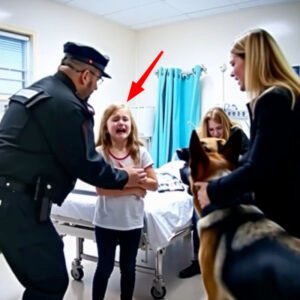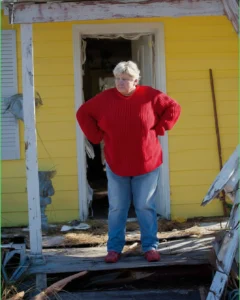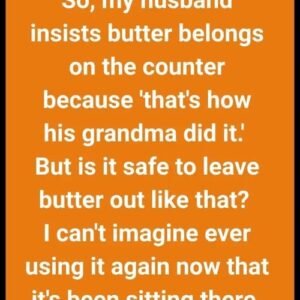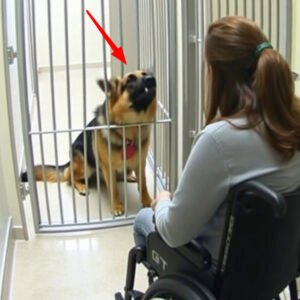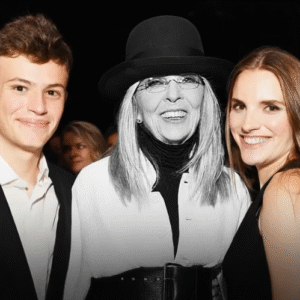The Biker, the Kitten, and Forty-Three Years of Grief
An Unexpected Sight
The biker sitting across from me on the subway was crying. Not just tearing up—full-on sobbing into a tiny orange and white kitten pressed against his chest like it was the most precious thing in the world.
His leather vest was covered in patches from decades of riding, his hands were scarred and rough from a lifetime of hard work, and his beard was streaked with gray that caught the fluorescent light of the subway car. He had to be at least sixty-five, maybe older. And he was completely falling apart, his massive shoulders shaking with the force of his grief.
Everyone else on the train was pretending not to notice, doing that typical city thing where you look everywhere except at the person having a moment. They studied their phones with sudden intensity. They examined the advertisements above the windows. They stared at the tunnel walls rushing past. Anything to avoid acknowledging the raw human emotion happening right in front of them.
But I couldn’t stop watching. There was something about the way he held that kitten—so carefully, like it was made of glass and might shatter at any moment—that made my throat tight with emotion I couldn’t quite name. The little thing was purring so loud I could hear it over the constant rumble of the train, a sound like a tiny engine running at full capacity.
The woman next to him—overdressed for the subway in a crisp business suit and expensive heels—kept glancing at him with thinly veiled disgust, as if his display of emotion was somehow offensive to her carefully curated professional image. Her lips were pressed into a thin line of disapproval, and she kept shifting away from him incrementally, as if grief might be contagious.
Finally, she stood up abruptly and moved to a seat further down the car, shaking her head with self-righteous indignation. The click of her heels on the subway floor seemed to echo in the uncomfortable silence.
That’s when the biker looked up, tears streaming down his weathered face in rivers, and said something that made everyone within earshot go completely silent. Even the businesswoman stopped mid-stride, frozen by his words.
Forty-Three Years
“I’m sorry,” he said to no one in particular, his voice breaking like shattered glass. “I just… I haven’t held anything this small and alive in forty-three years.”
Nobody said anything at first. The weight of those words hung in the air like smoke, thick and heavy with meaning we didn’t yet understand. The train rattled on through the tunnel, the rhythm of the tracks suddenly the only sound in our car. The biker wiped his eyes with the back of one massive hand, still cradling the kitten with the other. It had its tiny paws pressed against his chest, kneading his shirt with the innocent contentment only an animal can possess, completely unaware of the emotional storm swirling around it.
I don’t know what made me do it—maybe it was the raw honesty in his voice, or the way he held that kitten like it was salvation itself—but I moved seats. I stood up, crossed the aisle, and sat down next to him, close enough that our shoulders almost touched.
“You okay, brother?” I asked quietly, keeping my voice low and gentle.
He looked at me with red-rimmed eyes and let out a shaky laugh that sounded more like a sob. “No. Not really. But I think maybe I will be.” He stroked the kitten’s head with one calloused finger, the gesture so tender it nearly broke my heart. “Found this little guy in a dumpster outside the hospital. Just sitting there in a cardboard box, crying his head off. Couldn’t have been more than a few weeks old.”
“You taking him home?” I asked.
“I don’t have a home,” he said simply, the words delivered without self-pity, just as a statement of fact. “Been sleeping rough for three years now. Lost my apartment when I couldn’t work anymore—bad back, messed up knees from a bike accident that left me with more metal than bone in my legs. But yeah, I guess I’m taking him with me. Can’t leave him to die in a dumpster. Can’t let another innocent thing suffer when I could do something about it.”
The kitten mewed softly and climbed up closer to his neck, nestling into his beard like it was the safest place in the world. The biker’s weathered face crumpled again, fresh tears spilling down his cheeks.
“Sorry. God, I’m sorry. I don’t know why I can’t stop crying,” he said, his voice thick with embarrassment and grief.
But I thought I did. There was something in his eyes that I recognized—the kind of grief that lives in your bones, the kind you carry forever like a stone in your chest, the kind that never really heals but just becomes part of who you are.
“What happened forty-three years ago?” I asked quietly, though I suspected the answer would hurt to hear.
The Story Unfolds
He was silent for a long moment. The train pulled into a station, doors hissed open, people got on and off in the eternal dance of public transit. Someone bumped against us as they squeezed past. The kitten stayed curled against his chest, purring like a little motor, oblivious to the storm of emotion surrounding it.
Finally, the biker spoke, his voice barely above a whisper.
“My daughter was born forty-three years ago. September 14th, 1980. She weighed five pounds, two ounces. Had this little tuft of orange hair, just like this kitten.” His rough finger traced the kitten’s orange fur with infinite gentleness. “Tiniest fingernails I’d ever seen. Perfect little hands that wrapped around my finger like I was her whole world.”
His voice caught, cracked like ice breaking. “I held her for seventeen minutes. That’s all I got. Seventeen minutes before my ex-wife’s parents took her away. They said I wasn’t fit to be a father. Said bikers were criminals and degenerates. Said they’d make sure I never saw her again. And they meant it.”
My stomach dropped like a stone. “They took your baby?”
“Got a lawyer, a judge who agreed with them based on nothing but prejudice and my leather vest, and full custody awarded to my ex-wife with a restraining order against me like I was some kind of dangerous criminal.” His voice was bitter now, thick with decades of accumulated injustice. “I was twenty-two years old, working construction six days a week, riding with a club on weekends. I wasn’t perfect, but I wasn’t what they said I was. I didn’t drink, didn’t do drugs, didn’t have a criminal record. I loved my little girl more than anything in this world. But that didn’t matter to them.”
He pressed his face against the kitten’s soft fur, breathing deeply like he was trying to steady himself. “I tried to fight it. Spent every dollar I had on lawyers who took my money and delivered nothing. Went to every court date, dressed in my best clothes, trying to look respectable. Didn’t matter. The judge had already made up his mind. Last time I saw her, she was six months old. Her grandmother brought her to a supervised visit at some cold government building and wouldn’t let me hold her. Said I’d already done enough damage just by existing.”
“Jesus Christ,” I whispered, my own voice thick with emotion.
The Long Search
“I looked for her for years,” he continued, the words pouring out now like they’d been dammed up for decades. “Sent letters to every address I had—every single one came back marked ‘Return to Sender.’ Sent birthday cards with money inside, hoping she’d get them someday. Sent Christmas presents. All returned, unopened. Like I was already dead to them.”
The train lurched around a curve, and he instinctively tightened his hold on the kitten, protecting it from the motion.
“I hired a private investigator when she turned eighteen, thinking maybe she’d want to meet me once she was an adult, once they couldn’t control her anymore. Spent two thousand dollars I’d saved for months. Found out my ex-wife had remarried when my daughter was two. Her new husband adopted her. Changed her name completely. They told her I was dead. Told her I died in a motorcycle accident when she was a baby. Showed her a fake obituary they’d made.”
His voice broke completely, shattering into pieces. “She thinks I’m dead. She’s grown now, forty-three years old, maybe has kids of her own. Maybe she’s got grandkids by now. And she thinks her father died before she could remember him. She thinks I abandoned her before I even had the chance to love her.”
The kitten climbed up his chest and rubbed its tiny face against the biker’s beard, purring louder. He closed his eyes and more tears spilled down his cheeks, disappearing into his gray-streaked beard.
“This little guy started crying in that box and I heard him from across the parking lot. Same sound my daughter made in the hospital. That little newborn cry that goes straight through your heart. And I just…” He couldn’t finish the sentence, his throat too tight with emotion.
“You picked him up,” I said softly.
“I picked him up and he stopped crying immediately. Just looked at me with these big eyes and started purring. And I thought…” He swallowed hard. “I thought maybe I could keep something alive this time. Maybe I could be good for something, even if it’s just keeping a kitten safe. Maybe I could finally be the father I never got to be.”
He laughed bitterly, a sound devoid of any real humor. “Stupid, right? I’m homeless. I’ve got maybe fifteen dollars to my name. I’m taking a kitten I can’t feed to a place I don’t have. I can barely take care of myself.”
An Unexpected Response
“That’s not stupid,” I said firmly, surprising myself with the intensity in my voice. “That’s love. That’s the purest kind of love there is.”
An older woman sitting across from us had been listening, I realized. Tears were streaming down her own face. She reached into her purse and pulled out a twenty-dollar bill. She leaned forward and pressed it into the biker’s hand, closing his scarred fingers around it.
“For the kitten. For food,” she said, her voice trembling with emotion.
The biker stared at the money like he’d never seen cash before, like it was some alien artifact he couldn’t comprehend. “Ma’am, I can’t—”
“You can,” she said firmly, with a fierceness that brooked no argument. “And you will. That baby needs you. And you need him. Take the money. Buy him food. Get him what he needs.”
A younger guy in a hoodie sitting nearby pulled out his wallet. “Here’s another twenty. Get him to a vet, man. Make sure he’s healthy.” His voice was rough, like he was fighting his own tears.
A woman with two kids opened her purse, both children watching with wide, curious eyes. “I have thirty. Please take it. My daughter would never forgive me if I didn’t help.”
Within two minutes, something miraculous happened. Six different people had given the biker money. He sat there with nearly two hundred dollars in his lap, crying harder than before, his massive frame shaking with sobs. The kitten stayed pressed against his chest, purring contentedly, anchoring him to the moment.
“I don’t… I don’t know what to say,” he managed to choke out between sobs.
“Say you’ll take care of him,” the older woman said gently. “Say you’ll give him the love you couldn’t give your daughter. Say you’ll be the father you were never allowed to be.”
The biker nodded, unable to speak, his throat too tight with emotion. He held the kitten up carefully with both hands and looked at its tiny face, into those innocent eyes that looked back at him with complete trust.
“You hear that, little man? You’re stuck with me now. I’m gonna take care of you. I promise. I promise I won’t let anything happen to you.”
A New Beginning
The train pulled into my stop. I didn’t want to leave—I wanted to see how this story ended, wanted to know that he’d be okay—but I had to. Before I got off, I turned back to him one more time.
“What are you going to name him?”
The biker smiled for the first time—small, sad, but real. A genuine smile that crinkled the corners of his eyes and made him look ten years younger. “Hope. I’m gonna name her Hope. Because that’s what she gave me when I didn’t think I had any left.”
I nodded, my own eyes burning with unshed tears. “Take care of each other.”
“We will,” he said, stroking the kitten’s head with infinite tenderness. “We will.”
As the train doors began to close, I saw him stand up with new purpose, carefully tucking Hope inside his vest to keep her warm against his chest. Six strangers stood up with him, gathering around him like a protective circle, talking to him, writing down information, offering help.
The woman in the business suit who’d moved away earlier came back. I couldn’t hear what she said through the closing doors, but I saw her hand him a business card and squeeze his arm. Even she had been moved by what she’d witnessed.
The last thing I saw before the train pulled away was the biker standing in the middle of a small crowd of people, all of them gathered around him and the kitten, all of them wanting to help. He wasn’t crying anymore. His face was transformed—still streaked with tears, but lit with something that looked like hope, like purpose, like redemption.
The Truth We All Saw
For forty-three years, he’d carried the weight of losing his daughter alone. For forty-three years, he’d believed he wasn’t good enough to be a father. For forty-three years, he’d lived with the lie that his appearance, his lifestyle, his choice to ride a motorcycle made him unworthy of loving his own child.
But that day, on a random subway car heading downtown, with a kitten that needed him and strangers who saw past the leather and the beard and the rough exterior to the gentle heart beneath, maybe he finally understood what the rest of us could see clearly.
He was exactly the kind of father his daughter should have had. Patient, gentle, protective, willing to sacrifice everything for something small and vulnerable that needed him. And now, finally, he’d get the chance to prove it—even if it was to a tiny orange and white kitten who’d been thrown away in a box, discarded like trash by someone who couldn’t see her worth.
Sometimes the family we save is the family that saves us right back. Sometimes redemption comes in the smallest packages, with the loudest purr and the softest fur. Sometimes all it takes to heal a forty-three-year-old wound is the weight of something small and alive pressed against your heart, trusting you completely, needing you absolutely.
I never saw that biker again. I don’t know what happened to him and Hope. But I like to imagine them together—maybe in a shelter somewhere, or in a small apartment someone helped him find, or even back on the streets but together, keeping each other warm, keeping each other company, keeping each other alive.
I like to imagine that somewhere, a tiny orange and white cat named Hope is curled up on a worn leather vest, purring contentedly. And somewhere, a man who was told he wasn’t good enough to be a father is proving every single day that love has nothing to do with houses or money or conventional respectability.
Love is showing up. Love is picking up what others have discarded. Love is crying on a subway because you finally have something precious to protect again.
Love is giving someone—or something—a second chance at life, and discovering in the process that they’re giving you one too.
Parental alienation affects millions of families, causing immeasurable psychological harm to both parents and children. If you’re experiencing custody disputes or parental alienation, resources are available through family law organizations and support groups. Remember: being a good parent has nothing to do with your appearance, lifestyle choices, or economic status—it has everything to do with the love, care, and protection you provide.
